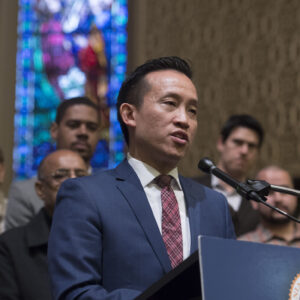Over 70 local jurisdictions and mayors have joined San Francisco in an effort to protect LGBTQ+ communities and ensure effective enforcement of anti-discrimination laws
SAN FRANCISCO (August 22, 2022) — San Francisco City Attorney David Chiu announced today that San Francisco has filed an amicus brief in 303 Creative v. Elenis urging the U.S. Supreme Court to uphold a Colorado anti-discrimination law. The brief, joined by 19 mayors and 53 cities and counties across the country, calls on the Court to affirm lower court decisions upholding the Colorado Anti-Discrimination Act (CADA), which bars businesses open to the public from discriminating against customers based their sexual orientation or other protected characteristics. In 303 Creative v. Elenis, a web design company that opposes same-sex marriage is seeking an exemption from CADA so that it will not have to provide wedding website design services for LGBTQ+ couples.

“We absolutely cannot stand for discrimination against our LGBTQ+ community or any other protected class,” said City Attorney David Chiu. “When discrimination occurs, it robs people of their dignity and sense of safety, and they participate less in public life. Local governments bear much of those costs. We urge the Court to uphold Colorado’s law and ensure they do not open the door to allow any kind of status-based discrimination.”
303 Creative LLC is a Colorado-based graphic and web design company. Its owner, Lorie Smith is opposed to same-sex marriage, does not want to provide wedding website design services to same-sex couples, and would like to post a notice saying the company will not create wedding websites for same-sex couples.
Colorado’s state law prohibits businesses from discriminating against customers by denying publicly available goods and services to a customer based on protected status. CADA also prohibits businesses from advertising their intent to engage in unlawful discrimination. Numerous state and local governments across the country have similar anti-discrimination laws, including San Francisco, which has longstanding nondiscrimination protections in public accommodations and other contexts.
In 2016, Smith filed a lawsuit seeking an exception to CADA on the basis of free speech. Both the U.S. District Court for the District of Colorado and the Tenth Circuit U.S. Court of Appeals ruled against 303 Creative and upheld CADA. Smith then filed a petition for writ of certiorari, which the U.S. Supreme Court granted in February 2022.
The amicus brief argues that anti-discrimination laws are a critical tool for local governments to protect the health, well-being, and economic security of local communities. Permitting businesses to refuse or restrict goods and services based on a customer’s legally-protected characteristics would impede local governments’ efforts to ensure equal treatment in our communities and have a chilling effect, decreasing participation in public life and local economies. Granting Petitioners an exception to CADA could undermine the enforcement of anti-discrimination laws across the country and open the door to many forms of status-based discrimination.
The full list of mayors and jurisdictions joining the brief include:
- Mayor London N. Breed and the City and County of San Francisco, California
- City of Alameda, California
- County of Alameda, California
- Mayor Kathy Sheehan and the City of Albany, New York
- City of Alexandria, Virginia
- Mayor Esther Manheimer and the City of Asheville, North Carolina
- City of Austin, Texas
- Mayor Brandon Scott and the City of Baltimore, Maryland
- Mayor John Hamilton and the City of Bloomington, Indiana
- City of Boston, Massachusetts
- County of Boulder, Colorado
- City of Brookhaven, Georgia
- County of Buncombe, North Carolina
- Town of Carrboro, North Carolina
- Mayor Maria Rivera and the City of Central Falls, Rhode Island
- City of Chicago, Illinois
- City of Cincinnati, Ohio
- Mayor Patrick L. Wojahn and the City of College Park, Maryland
- City of Dallas, Texas
- Mayor Michael B. Hancock and the City and County of Denver, Colorado
- City of Detroit, Michigan
- Mayor Joseph Geierman and the City of Doraville, Georgia
- City of Duluth, Minnesota
- City of Durham, North Carolina
- City of Emeryville, California
- City of Evanston, Illinois
- City of Gaithersburg, Maryland
- Mayor Jenn Weaver and the Town of Hillsborough, North Carolina
- Mayor Quinton D. Lucas and the City of Kansas City, Missouri
- Mayor Danene Sorace and the City of Lancaster, Pennsylvania
- City of Los Angeles, California
- County of Los Angeles, California
- Mayor Satya Rhodes-Conway and the City of Madison, Wisconsin
- County of Marin, California
- County of Milwaukee, Wisconsin
- City of Minneapolis, Minnesota
- County of Monterey, California
- City of New York, New York
- Mayor Gina-Louise Sciarra and the City of Northampton, Massachusetts
- City of Oakland, California
- Mayor Cheryl Selby and the City of Olympia, Washington
- City of Portland, Oregon
- City of Sacramento, California
- City of Saint Paul, Minnesota
- City of San Diego, California
- County of San Mateo, California
- County of Santa Clara, California
- City of Santa Cruz, California
- Mayor Keith Scully and the City of Shoreline, Washington
- Mayor Jeffrey Z. Slavin and the Town of Somerset, Maryland
- Mayor Katjana Ballantyne and the City of Somerville, Massachusetts
- Mayor Caroline Simmons and the City of Stamford, Connecticut
- City of West Hollywood, California
- Mayor John Muhlfeld and the City of Whitefish, Montana
The case is 303 Creative LLC, et al. v. Aubrey Elenis, et al., in the U.S. Supreme Court, No. 21-476. A copy of the amicus brief can be found here.
###
